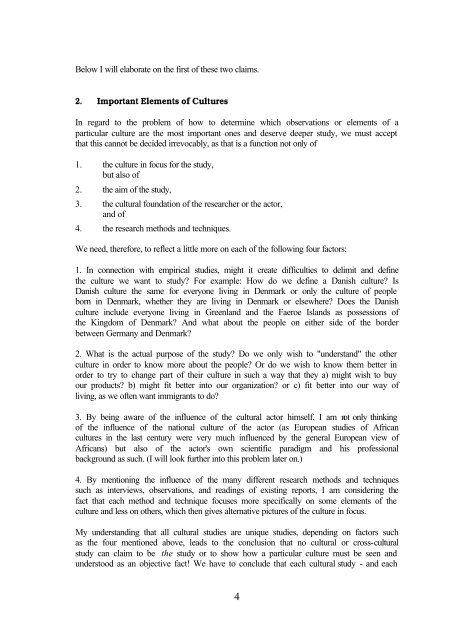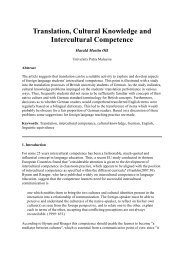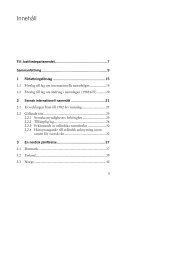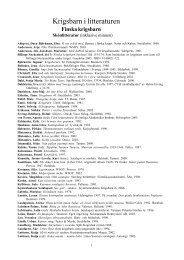the complexity of intercultural communication in cross-cultural
the complexity of intercultural communication in cross-cultural
the complexity of intercultural communication in cross-cultural
Create successful ePaper yourself
Turn your PDF publications into a flip-book with our unique Google optimized e-Paper software.
Below I will elaborate on <strong>the</strong> first <strong>of</strong> <strong>the</strong>se two claims.<br />
2. Important Elements <strong>of</strong> Cultures<br />
In regard to <strong>the</strong> problem <strong>of</strong> how to determ<strong>in</strong>e which observations or elements <strong>of</strong> a<br />
particular culture are <strong>the</strong> most important ones and deserve deeper study, we must accept<br />
that this cannot be decided irrevocably, as that is a function not only <strong>of</strong><br />
1. <strong>the</strong> culture <strong>in</strong> focus for <strong>the</strong> study,<br />
but also <strong>of</strong><br />
2. <strong>the</strong> aim <strong>of</strong> <strong>the</strong> study,<br />
3. <strong>the</strong> <strong>cultural</strong> foundation <strong>of</strong> <strong>the</strong> researcher or <strong>the</strong> actor,<br />
and <strong>of</strong><br />
4. <strong>the</strong> research methods and techniques.<br />
We need, <strong>the</strong>refore, to reflect a little more on each <strong>of</strong> <strong>the</strong> follow<strong>in</strong>g four factors:<br />
1. In connection with empirical studies, might it create difficulties to delimit and def<strong>in</strong>e<br />
<strong>the</strong> culture we want to study For example: How do we def<strong>in</strong>e a Danish culture Is<br />
Danish culture <strong>the</strong> same for everyone liv<strong>in</strong>g <strong>in</strong> Denmark or only <strong>the</strong> culture <strong>of</strong> people<br />
born <strong>in</strong> Denmark, whe<strong>the</strong>r <strong>the</strong>y are liv<strong>in</strong>g <strong>in</strong> Denmark or elsewhere Does <strong>the</strong> Danish<br />
culture <strong>in</strong>clude everyone liv<strong>in</strong>g <strong>in</strong> Greenland and <strong>the</strong> Faeroe Islands as possessions <strong>of</strong><br />
<strong>the</strong> K<strong>in</strong>gdom <strong>of</strong> Denmark And what about <strong>the</strong> people on ei<strong>the</strong>r side <strong>of</strong> <strong>the</strong> border<br />
between Germany and Denmark<br />
2. What is <strong>the</strong> actual purpose <strong>of</strong> <strong>the</strong> study Do we only wish to "understand" <strong>the</strong> o<strong>the</strong>r<br />
culture <strong>in</strong> order to know more about <strong>the</strong> people Or do we wish to know <strong>the</strong>m better <strong>in</strong><br />
order to try to change part <strong>of</strong> <strong>the</strong>ir culture <strong>in</strong> such a way that <strong>the</strong>y a) might wish to buy<br />
our products b) might fit better <strong>in</strong>to our organization or c) fit better <strong>in</strong>to our way <strong>of</strong><br />
liv<strong>in</strong>g, as we <strong>of</strong>ten want immigrants to do<br />
3. By be<strong>in</strong>g aware <strong>of</strong> <strong>the</strong> <strong>in</strong>fluence <strong>of</strong> <strong>the</strong> <strong>cultural</strong> actor himself, I am not only th<strong>in</strong>k<strong>in</strong>g<br />
<strong>of</strong> <strong>the</strong> <strong>in</strong>fluence <strong>of</strong> <strong>the</strong> national culture <strong>of</strong> <strong>the</strong> actor (as European studies <strong>of</strong> African<br />
cultures <strong>in</strong> <strong>the</strong> last century were very much <strong>in</strong>fluenced by <strong>the</strong> general European view <strong>of</strong><br />
Africans) but also <strong>of</strong> <strong>the</strong> actor's own scientific paradigm and his pr<strong>of</strong>essional<br />
background as such. (I will look fur<strong>the</strong>r <strong>in</strong>to this problem later on.)<br />
4. By mention<strong>in</strong>g <strong>the</strong> <strong>in</strong>fluence <strong>of</strong> <strong>the</strong> many different research methods and techniques<br />
such as <strong>in</strong>terviews, observations, and read<strong>in</strong>gs <strong>of</strong> exist<strong>in</strong>g reports, I am consider<strong>in</strong>g <strong>the</strong><br />
fact that each method and technique focuses more specifically on some elements <strong>of</strong> <strong>the</strong><br />
culture and less on o<strong>the</strong>rs, which <strong>the</strong>n gives alternative pictures <strong>of</strong> <strong>the</strong> culture <strong>in</strong> focus.<br />
My understand<strong>in</strong>g that all <strong>cultural</strong> studies are unique studies, depend<strong>in</strong>g on factors such<br />
as <strong>the</strong> four mentioned above, leads to <strong>the</strong> conclusion that no <strong>cultural</strong> or <strong>cross</strong>-<strong>cultural</strong><br />
study can claim to be <strong>the</strong> study or to show how a particular culture must be seen and<br />
understood as an objective fact! We have to conclude that each <strong>cultural</strong> study - and each<br />
4

















